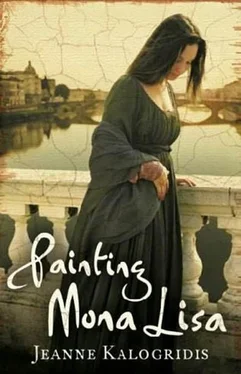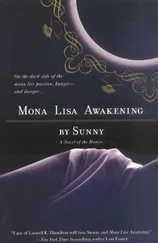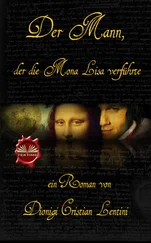I didn’t meet his gaze; perhaps he would think it modesty. “You are my husband. I cannot fight your wishes.”
He sat down beside me, letting his full weight drop carelessly onto the bed, and put his goblet down on the night table; the wine sloshed over the rim and perfumed the air. “Don’t you have wishes yourself? Surely you want more children. What mother doesn’t?”
I couldn’t look at him. “Of course I want more.”
He took my hand; I let it go limp in his grasp. “I am not a fool, Lisa,” he said.
The words caused the hairs on the back of my neck to prick. Did he know? Had my searches in his study been detected? Had Claudio seen something?
But he continued, “I know that you don’t love me, though I had hoped you would learn to. You are a very beautiful woman and an intelligent one. I take pride in calling you my wife. And I had hoped you would repay my kindnesses by giving me many heirs.”
“Of course,” I repeated.
He stood up. His tone grew businesslike, cold, faintly threatening. “Lie down, then.”
I lay down.
It was an impersonal procedure. He remained completely dressed, and lowered his leggings only as far as necessary. With care but not tenderness, he crawled between my legs, lifted my camicia , and inserted himself. But he was not altogether ready; in fact, his proximity to me quenched all ardor and he shrank. He remained still for a moment, breathing hard, then suddenly pushed his palms against the mattress, raising his upper torso.
I thought he meant to extricate himself. Immediately I stirred, hopeful that he would proclaim defeat and leave.
“Lie down, I said!” He lifted one hand, turned the back of it toward me as if preparing to strike. I flinched and turned my face away.
This pleased him. He grew inside me; as he did, he closed his eyes and began to whisper to himself. “Whore. Insolent bitch!”
I thought of nothing. I let my head strike the wooden headboard. I listened to it hammer against the wall.
This continued long, painful moments; it was difficult for him, but he goaded himself on with foul words until at last he achieved his aim.
When he was done, he pushed himself away from me, quickly arranged himself, and left without a word, closing the door behind him.
I called for Zalumma. A good wife would have lain in the bed and allowed herself to become pregnant. But I rose at once, and when Zalumma arrived, I said, my voice shaking: “I won’t bear his child. Do you understand? I won’t!”
Zalumma understood. The next morning, she brought me a flagon of tea and instructed me on how to use it.
M y father’s warning had been prophetic: The rain never abated. At mid-month, the Arno flooded, washing away all the crops. In early June, the Rifredi River spilled over its banks, destroying what few fields were left.
By the time the sky dried up in summer, the city suffered from an outbreak of fever. For Matteo’s sake, I permitted no visitors to the nursery, nor did I allow him to leave the palazzo. He was just starting to take his first clumsy steps; the more I looked into his face, the more I saw his father’s.
I left the house rarely. Once the fever became widespread, I forbade Zalumma to go with Agrippina to market, and I went to Santissima Annunziata only irregularly, owing to the fact that I found no new letter in Francesco’s desk during those weeks.
But, wishing to appear a good wife and allay suspicion, I continued to attend Savonarola’s Saturday sermons for the women. His ranting against the Medici and their followers continued, but was combined with another obsession: Alexander’s cohabitation, in the Vatican, with his young mistress, Giulia Farnese, and his penchant for inviting prostitutes to his parties.
“You leader of the Church!” he railed. “Each night you go to your concubine, each morning you go take the sacraments; you have provoked God’s anger. You harlots, you miserable pimps, you have turned your churches into stalls for whores!” And when the cardinals grumbled that he ought not speak so of the Pope, he proclaimed: “It is not I who threaten Rome, but God! Let her do what she wills, Rome will never extinguish this flame!”
Several nights later, after my husband had gone to visit his own concubines and the servants had all retired, I made my way to Francesco’s study.
The letter hidden in the desk was plaintive.
Let him rail against the Medici, I said. But I did not encourage him to attack Alexander-far from it! He is undoing all my careful work here in Rome. Make it exceedingly clear to those involved: If they do not stop this foolishness at once, they will pay dearly!
In the interim: The people’s hunger could lead to grumbling. Rally them. Focus their attention not on their bellies, but on Heaven, and Fra Girolamo .
I silently repeated the words to myself, emblazoning each one in my mind so that I could summon them again at will.
The next morning, I left the book for Isabella to see. The following day, I rode to Santissima Annunziata just as the bells announced sext.
Salai made no further attempt at subterfuge. The Servants of Mary were all at prayer and would soon be supping at the refectory; our way was clear. We walked from the chapel to a narrow corridor, then up a flight of spiraling stone stairs. At the top was a blank wooden wall; Salai went to the corner and hooted, soft as a dove, and a panel hidden in the wall slid open. We stepped inside.
A young artist wearing the long, paint-stained tunic of his craft closed the panel behind us. We walked down a corridor that opened onto three rooms: a monk’s cell with a cot; a larger chamber where a pair of young men, fresh plaster streaked on their cheeks, their hands, and their long aprons, were preparing a fresco; and the room where I had met with Leonardo.
The portrait of me still rested on the easel; Salai informed me that in his haste, Leonardo had forgotten to take it. I studied it: Except for the outlines and shadows, my skin was represented by the stark white of the gesso panel. I looked like a half-materialized ghost.
I smiled at the painting.
And I smiled at Salai as I recited the contents of the letter to him. He wrote the words down slowly, laboriously, stopping several times to ask me to repeat myself.
I left the church feeling lighthearted. Leonardo’s efforts were bearing fruit, I thought. The Pope would surely silence Savonarola now. The Medici’s enemies were flailing, and it was only a matter of time before I would greet Piero again.
I smiled because I was ignorant. I smiled because I did not realize that the letter in fact threatened all that I held dear.
In the fall, plague came. Savonarola still preached, but Francesco allowed me to remain home. No new letters arrived for him from Rome requiring me to venture out to the family chapel. I was deprived of my forays to Santissima Annuziata, and with the worsening weather, I could neither sit out on my balcony nor walk in the garden. I chafed.
The loss of the spring crops devastated Tuscany. Farmers and peasants left the barren countryside and swarmed into the city seeking food. Men and women lined the streets, begging for scraps and alms. They slept on the steps of churches, in the doorways of the botteghe; Francesco went to his shop one morning to find a mother and two children propped against his door, all dead. As the nights grew colder, some froze to death, but most died from starvation and plague. Each morning brought so many new corpses, it was impossible to remove them all. Florence began to stink.
Despite Francesco’s wealth and connections, we felt the lack. Agrippina ran out of bread first, then flour, so we went without our customary pasta in broth; the hunters brought us fowl, which we ate until we could no longer bear the sight of it.
Читать дальше
Конец ознакомительного отрывка
Купить книгу












